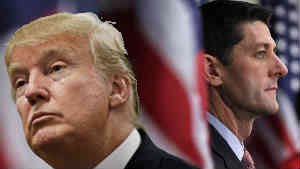By Dan Calabrese ——Bio and Archives--June 7, 2016
American Politics, News | CFP Comments | Reader Friendly | Subscribe | Email Us
 It's just a start, and he says as much. It has to be. It doesn't mention what to do with ObamaCare or entitlements, so we can expect that he and his colleagues in the House are still working on those and we'll hear about them soon enough.
This stuff is basic blocking and tackling, but that doesn't mean it's without value. Paul Ryan told us last week that he's voting for Donald Trump for precisely this reason: A Republican legislative agenda has no chance if Hillary becomes president. With Trump, you can at least enjoy a fighting chance that some basic common-sense ideas meet with a presidential signature while you work with him on the really big ones.
It's just a start, and he says as much. It has to be. It doesn't mention what to do with ObamaCare or entitlements, so we can expect that he and his colleagues in the House are still working on those and we'll hear about them soon enough.
This stuff is basic blocking and tackling, but that doesn't mean it's without value. Paul Ryan told us last week that he's voting for Donald Trump for precisely this reason: A Republican legislative agenda has no chance if Hillary becomes president. With Trump, you can at least enjoy a fighting chance that some basic common-sense ideas meet with a presidential signature while you work with him on the really big ones. Instituting work requirements for welfare recipients and for recipients of the Supplemental Nutrition Assistance Program, or food stamps, who are able to work; Consolidating or streamlining 18 federal food-assistance programs and myriad housing programs, such as the Rural Housing Service rental assistance program and HUD’s Housing Choice voucher program; Streamlining federal funding for at-risk youths and for 45 separate early childhood programs and giving states and local governments more flexibility to address their residents’ needs; Rolling back federal requirements and regulations for technical education programs and for colleges and universities, which one study commissioned by Vanderbilt University last year estimated cost schools $27 billion annually. The plan also recommends consolidating the nine federal-aid programs for higher education into three. Making it easier for businesses to team up and offer joint 401k plans.
Overall, federal funding of social programs should be more focused on results, the task force concluded, and measuring them by whether they are making a difference in people’s lives — are they getting people back to work, for instance, or reducing poverty. “Common sense says the federal government should fund only programs that have a track record of success,” the report says. “Yet the federal government frequently pays for well-intentioned programs and services that have no evidence of effectiveness — and in many cases, even when the program is proven not to work at all.”I'm bracing myself for the inevitable barrage of Ryan hate, the welfare work requirement notwithstanding. I'm sure some will argue that most of the programs in question here are not the responsibility of the federal government to any degree, and the only acceptable "true conservative" proposal would be to end them entirely and return them to the states. I don't disagree that this would be better policy in the abstract, but I think a lot of people who operate solely on a philosophical plane underestimate the difficulty of getting from here to there - and I don't just mean politically. The extent to which Washington has hijacked these programs makes it virtually impossible to simply tell the states, "here, you take over" and expect them to be ready to roll on day one. If can start moving toward that vision, it's a serious and substantive win. Ryan's political goal here is a tricky one. He and many other Republicans believe the GOP suffers from its small-government stance because it makes it easy for Democrats to claim they're "against everything." The right response to that is not to advocate government solutions to everything under the sun just so you can claim to be "for" stuff. It's to show the moves you'll make that would actually improve people's lives - and that starts by showing how government initiatives designed to help people are actually doing the opposite and wasting money.
Support Canada Free Press

View Comments
Dan Calabrese’s column is distributed by HermanCain.com, which can be found at HermanCain
Follow all of Dan’s work, including his series of Christian spiritual warfare novels, by liking his page on Facebook.